For more than a thousand years, English literature has been studied and enjoyed by readers the world over. Great works of English literature include novels by Dickens and the Bronte sisters, poetry by Keats, Wordsworth and Shelley, and plays by Shakespeare. Let us together review some of these wonderful literary treasures.

English Literature: A Quick and Easy Guide
English literature is a treasured part of the world's cultural heritage. The novels, poetry and drama in the English language may be enjoyed by us all.
Old English Literature (7th century - 1066)
Probably the greatest literary work which survives from the Old English or Anglo-Saxon period is Beowulf. This is a work of epic poetry, which tells the story of the great hero, Beowulf, and his struggles which saved the Anglo-Saxon people from destruction. Written in Old English, this poem achieved the status of a national epic for the Anglo-Saxons, much in the way that the Iliad was a national epic for ancient Greek people.
Two other poets, Caedmon and Cynewulf, wrote in this period.
Middle English Literature (12th century - 1470s)
The invasion of England by the Norman French under their leader, William the Conqueror, in 1066 AD marked the end of Anglo-Saxon England. Many elements from the conquerors' Norman French language were assimilated into the native Anglo-Saxon language, giving rise to Middle English.
Geoffrey Chaucer was the most celebrated writer in Middle English period. His greatest work, the Canterbury Tales, a collection of stories, each one by one of a group of fictional pilgrims en route to Canterbury cathedral. These stories range from courtly to bawdy in tone and remain a wonderful experience for modern readers or DVD viewers (video versions of the Tales were recently made by the BBC to great popular acclaim).
Other great works from this period are the poems Sir Gawain and the Green Knight and William Langland's The Vision of Piers Plowman; Sir Thomas Mallory's Le Morte d'Arthur, a collection of stories about King Arthur; and a number of moving English and Scottish ballads, such as Sir Patrick Spens.
The Canterbury Tales
The Renaissance (15th-16th centuries)
The ending of the feudal Middle Ages and the beginning of the Renaissance ("rebirth") era, in which a new freedom of inquiry and a new interest in classical learning came into vogue, was reflected in English literature. In England the Renaissance overlapped with the Tudor period, including the reigns of King Henry VIII and Queen Elizabeth I.
Under Elizabeth I, England's navigators explored new seas and the country became a world power. The Elizabethan era was also the time of brilliant poets and dramatists.
The poets included Edmund Spenser and his masterpiece, The Faerie Queene) and William Shakespeare (who penned 154 sonnets and two narrative poems). The dramatists included Christopher Marlowe (with plays such as Doctor Faustus) and, again, William Shakespeare (with 35 plays of genius, including great tragedies such as Hamlet, Macbeth, Othello and King Lear, and comedies such as As You Like It and A Midsummer Night's Dream).
Another magnificent achievement of the Renaissance era was the King James translation of the Bible, known as the King James Bible. Completed by a team of 47 scholars in 1611, the majestic and simple language of this translation has influenced all writers ever since.
To Be Or Not To Be soliloquy
Sir Lawrence Olivier's Hamlet film (1948)
17th Century
The 17th century was a turbulent period of struggles between the supporters of the monarchy and of the Parliament.
John Bunyan's The Pilgrim's Progress (1678) was a great work from this period. Written in a plain, Biblical style, it tells of Christian's trials and tribulations as he strives to reach the Celestial City.
The Diary of Samuel Pepys is one man's expression of his love for the great city of London. The Diary records his daily experiences and is an important record of life in London in the 17th century, including details about the Great Plague (1664–65) and the Great Fire (1666).
A great 17th century poet was the Puritan, John Milton (1608-74). His masterpiece is the epic poem, Paradise Lost (1667).
The metaphysical poets, such as John Donne, George Herbert, and Andrew Marvell, wrote important poetry which is still read today.
Scenes from Milton's Paradise Lost, Part I
The 18th Century
Modern essays made their first appearance in English literature in the essays of Sir Richard Steele in the periodical, The Tatler (1709–11) and in those of Joseph Addison in The Spectator (1711–12).
Daniel Defoe was a journalist and novelist, whose great novels included Robinson Crusoe (1719) and Moll Flanders (1722).
The Anglo-Irish writer, Jonathan Swift, wrote the satirical novel, Gulliver's Travels (1726).
Alexander Pope was a great satirical poet, famous for his epigrams. His great poems included The Dunciad (1728) and The Rape of the Lock (1712).
Other poets included Thomas Gray (his most famous poem being his Elegy Written in a Country Churchyard) and George Crabbe (especially his political and social satire, The Village).
Important developments in fiction occurred with Samuel Richardson' s Pamela (1740); Henry Fielding's Joseph Andrews (1742) and Tom Jones (1749); Tobias Smollett's Humphry Clinker (1771); and Laurence Sterne's Tristram Shandy (1760–67).
Samuel Johnson wrote his great English dictionary but even more famous these days is the biography of Johnson, The Life of Samuel Johnson, LL.D. (1791), written by his friend, James Boswell and which records Johnson's interesting personality and wonderful conversation.
Oliver Goldsmith wrote a great novel, The Vicar of Wakefield (1766), a great play, She Stoops to Conquer (1773) and a great poem, The Deserted Village (1770). Richard Brinsley Sheridan wrote the "comedy of manners" plays, The School for Scandal (1777) and The Rivals (1775).
Gulliver's Travels (by Jonathan Swift)
The Romantic Era (1785-1830)
The Romantic movement was in part a revolt against the rational and classical ideals of the Enlightenment, a belief in the innate goodness of man and in the oneness of humanity, a reliance on emotion, on individualism, on nature, and on folk history and medievalism as the source of authentic experience.
Great romantic poets included William Blake (Songs of Innocence), Samuel Taylor Coleridge (The Rime of the Ancient Mariner; Christabel), Lord Byron (Manfred; Don Juan), Percy Bysshe Shelley (Prometheus Unbound; Ode to the West Wind); and John Keats (Ode on a Grecian Urn; Ode to a Nightingale), while key romantic novelists and essays included Sir Walter Scott, Charles Lamb, and Thomas De Quincey.
Jane Austen was an author who lived in this time but whose great novels, such as Pride and Prejudice (1813), were of the realist, rather than the romantic, school.
With Silence and Tears (by Lord Byron)
The Victorian Era (1837-1901)
English literature which appeared during the reign of Queen Victoria (1832-1901) is known as the Victorian era of literature. This was the period of social restraint, scientific advances, industrial revolution, and imperialism.
Major Victorian poets were Alfred Tennyson (In Memoriam), Robert Browning, Matthew Arnold, Dante Gabriel Rossetti, William Morris, Algernon Charles Swinburne (Mary Stuart) and Gerard Manley Hopkins.
Major novelists included Charles Dickens (David Copperfield), William Makepeace Thackeray (Vanity Fair), Charlotte Bronte (Jane Eyre), Emily Bronte (Wuthering Heights), Anthony Trollope, George Eliot (Middlemarch), and Wilkie Collins (The Moonstone).
The psychological novel made its appearance in the Victorian era with the novelists, Thomas Hardy (Tess of the d'Urbevilles) and Samuel Butler (The Way of All Flesh). Other great novelists included Robert Louis Stevenson (Treasure Island), Rudyard Kipling (Captains Courageous) and Lewis Carroll (Alice's Adventures in Wonderland).
Fine drama came from Oscar Wilde and George Bernard Shaw.
Charles Dickens
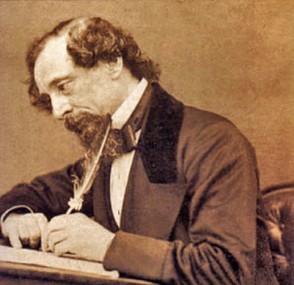 Charles Dickens |
The Changing World of Charles Dickens
Modern English Literature
This period was characterized by the ongoing development of science and technology, by the rising influence of psychology and the social sciences, and by a loss of belief in religion and old values and conventions in the wake of the catastrophe of the Great War.
In the early 20th century the top novelists were John Galsworthy (The Forsyte Saga), H. G. Wells (War of the Worlds), and Joseph Conrad (Lord Jim).
Poets of renown included Robert Bridges, A. E. Housman (Shropshire Lad), John Masefield, and Walter de la Mare.
Dramatists of the early period included Sir James M. Barrie (The Admirable Crichton) and the Irish-born William Butler Yeats and John Millington Synge.
Writers of the First World War and just after included the war poets, Rupert Brooke and Siegfried Sassoon, and the novelists and short story writers, William Somerset Maugham (Of Human Bondage), D. H. Lawrence (Sons and Lovers and Women in Love), James Joyce (Ulysses), Virginia Woolf (Mrs. Dalloway and To the Lighthouse), and Aldous Huxley (Brave New World).
In the 1920s and 1930s came the poets, T. S. Eliot, W. H. Auden, Dylan Thomas and Robert Graves.
Novelists included William Golding (Lord of the Flies), George Orwell (Animal Farm and Nineteen Eighty-Four), C. P. Snow (Strangers and Brothers), Evelyn Waugh (Decline and Fall ), Graham Greene (The Quiet American), Malcolm Lowry (Under the Volcano), and Anthony Powell (A Dance to the Music of Time).
The Recorded Voice Of Virginia Woolf
English Literature on the Web
English Literature
Wide-ranging article written by the 19th century scholar, Matthew Arnold.
William Shakespeare quotes
Selection of quotes from the plays and poems of Shakespeare.
More Humanities articles
You might also like
Book Review: By Its Cover, a Commissario Guido Brunetti Myster...By Its Cover, the twenty-third Commissario Guido Brunetti mystery by Donna Le...
The Discworld Evolution of Granny WeatherwaxTerry Pratchett's Discworld is one of the most successful fantasy series of a...
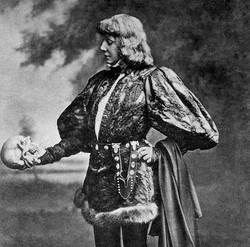

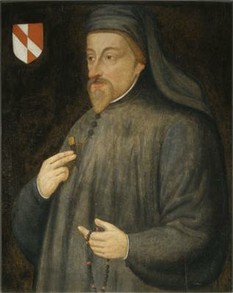
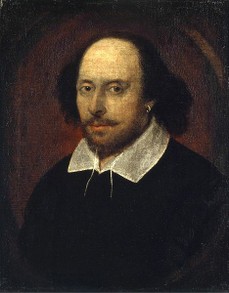
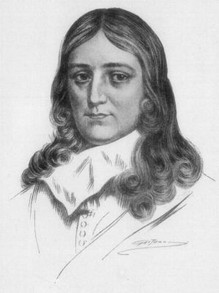
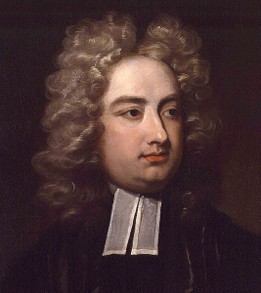
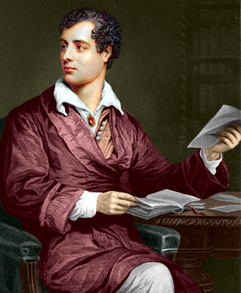
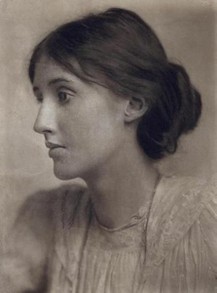







 Ancient Rome: History and Heritageon 02/28/2012
Ancient Rome: History and Heritageon 02/28/2012
 Ancient Greece: History and Heritageon 10/14/2012
Ancient Greece: History and Heritageon 10/14/2012
 Schumann: The Genius Who Composed Scenes From Childhoodon 04/29/2012
Schumann: The Genius Who Composed Scenes From Childhoodon 04/29/2012
 Mahler: The Genius Who Composed the Resurrection Symphonyon 03/04/2012
Mahler: The Genius Who Composed the Resurrection Symphonyon 03/04/2012

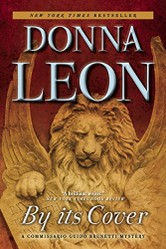
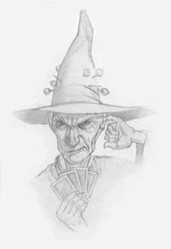
Comments
I love English literature. I enjoyed reading Macbeth. I must say I am not big fan of W. Shakespeare (shame on me :D), but I LOVE Macbeth. But I am fan of English modern Literature. Orwell and Huxley left huge impression on my view of the modern world and society.